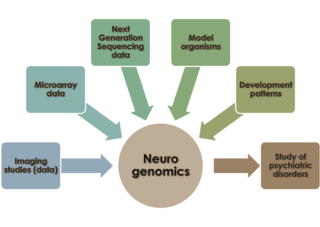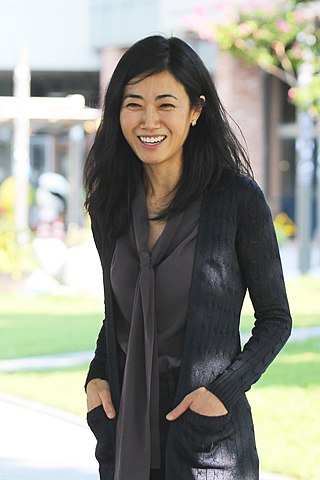
Fragile X syndrome (FXS) is a genetic disorder characterized by mild-to-moderate intellectual disability. The average IQ in males with FXS is under 55, while about two thirds of affected females are intellectually disabled. Physical features may include a long and narrow face, large ears, flexible fingers, and large testicles. About a third of those affected have features of autism such as problems with social interactions and delayed speech. Hyperactivity is common, and seizures occur in about 10%. Males are usually more affected than females.

Pleiotropy occurs when one gene influences two or more seemingly unrelated phenotypic traits. Such a gene that exhibits multiple phenotypic expression is called a pleiotropic gene. Mutation in a pleiotropic gene may have an effect on several traits simultaneously, due to the gene coding for a product used by a myriad of cells or different targets that have the same signaling function.
Neuroinformatics is the emergent field that combines informatics and neuroscience. Neuroinformatics is related with neuroscience data and information processing by artificial neural networks. There are three main directions where neuroinformatics has to be applied:

The heritability of autism is the proportion of differences in expression of autism that can be explained by genetic variation; if the heritability of a condition is high, then the condition is considered to be primarily genetic. Autism has a strong genetic basis. Although the genetics of autism are complex, autism spectrum disorder (ASD) is explained more by multigene effects than by rare mutations with large effects.
Mady Hornig is an American psychiatrist and an associate professor of epidemiology at Columbia University's Mailman School of Public Health. A physician-scientist, her research involves clinical, epidemiological, and animal model research on autism and related neurodevelopmental conditions. She directs the clinical core of an international investigation of the role of Borna disease virus in human mental illness and participates as a key investigator for the Autism Birth Cohort (ABC) project, a large prospective epidemiological study, based in Norway, that is identifying how genes and timing interact with environmental agents preceding the onset of autism spectrum diagnoses. In 2006, she was appointed as guest professor at the school of basic medical science of Beijing University in Beijing, China.

ASH1L is a histone-lysine N-methyltransferase enzyme encoded by the ASH1L gene located at chromosomal band 1q22. ASH1L is the human homolog of Drosophila Ash1.

Neurogenomics is the study of how the genome of an organism influences the development and function of its nervous system. This field intends to unite functional genomics and neurobiology in order to understand the nervous system as a whole from a genomic perspective.

Gerald D. Fischbach is an American neuroscientist. He received his M.D. from the Weill Cornell Medical College of Cornell University in 1965 before beginning his research career at the National Institutes of Health in 1966, where his research focused on the mechanisms of neuromuscular junctions. After his tenure at the National Institutes of Health, Fischbach was a professor at Harvard University Medical School from 1972 to 1981 and from 1990 to 1998 and the Washington University School of Medicine from 1981 to 1990. In 1998, he was named the director of the National Institute of Neurological Disorders and Stroke before becoming the Vice President and Dean of the Health and Biomedical Sciences, the Dean of the Faculty of Medicine, and the Dean of the Faculty of Health Sciences at Columbia University from 2001 to 2006. Gerald Fischbach currently serves as the scientific director overseeing the Simons Foundation Autism Research Initiative. Throughout Fischbach's career, much of his research has focused on the formation and function of the neuromuscular junction, which stemmed from his innovative use of cell culture to study synaptic mechanisms.

Jacqueline N. Crawley is an American behavioral neuroscientist and an expert on rodent behavioral analysis. Since July 2012, she is the Robert E. Chason Chair in Translational Research in the MIND Institute and professor of psychiatry and behavioral sciences at the University of California, Davis School of Medicine in Sacramento. Previously, from 1983–2012, she was chief of the Laboratory of Behavioral Neuroscience in the intramural program of the National Institute of Mental Health. Her translational research program focuses on testing hypotheses about the genetic causes of autism spectrum disorders and discovering treatments for the diagnostic symptoms of autism, using mouse models. She has published more than 275 peer-reviewed articles in scientific journals and 110 review articles and book chapters. According to Scopus, her works have been cited over 36,000 times, giving her an h-index of 99. She has co-edited 4 books and is the author of What's Wrong With my Mouse? Behavioral Phenotyping of Transgenic and Knockout Mice, which was very well received.
Stephen Wayne "Steve" Scherer is a Canadian scientist who currently serves as the Chief of Research at The Hospital for Sick Children (SickKids) and distinguished University Professor at the University of Toronto. He obtained his PhD at the University of Toronto under Professor Lap-chee Tsui. Together they founded Canada's first human genome centre, the Centre for Applied Genomics (TCAG). He is a Senior Fellow of Massey College at the University of Toronto. In 2014, he was named an esteemed Clarivate Citation laureate in Physiology or Medicine for the “Discovery of large-scale gene copy number variation and its association with specific diseases.”
Eric Courchesne is an autism researcher and Professor of Neurosciences in University of California, San Diego School of Medicine and Director of the UCSD Autism Center located in La Jolla, California.
Joseph D. Buxbaum is an American molecular and cellular neuroscientist, autism researcher, and the Director of the Seaver Autism Center at the Icahn School of Medicine at Mount Sinai. Buxbaum is also, along with Simon Baron-Cohen, the co-editor of the BioMed Central journal Molecular Autism, and is a member of the scientific advisory board of the Autism Science Foundation. Buxbaum is a Professor of Psychiatry, Neuroscience, and Genetics and Genomic Sciences. He is also the Vice Chair for Research and for Mentoring in the Department of Psychiatry at the Icahn School of Medicine at Mount Sinai.
The development of an animal model of autism is one approach researchers use to study potential causes of autism. Given the complexity of autism and its etiology, researchers often focus only on single features of autism when using animal models.

Patricia Howlin is Professor of Clinical Child Psychology at the Institute of Psychiatry, London, whose principal research interests focus on autism and developmental disorders including Williams syndrome, developmental language disorders and Fragile X. Howlin had a specific interest in the adult outcomes for individuals with autism. She published and presented on this subject extensively.
Wendy K. Chung is an American clinical and molecular geneticist and physician. She is the Chair of the Department of Pediatrics at Boston Children's Hospital and is on the faculty at Harvard Medical School. She is the author of 700 peer-reviewed articles and 75 chapters and has won several awards as a physician, researcher, and professor. Chung helped to initiate a new form of newborn screening for spinal muscular atrophy which is used nationally and was among the plaintiffs in the Supreme Court case which banned gene patenting.
The Simons Foundation is an American private foundation established in 1994 by Marilyn and Jim Simons with offices in New York City. As one of the largest charitable organizations in the United States with assets of over $5 billion in 2022, the foundation's mission is to advance the frontiers of research in mathematics and the basic sciences. The foundation supports science by making grants to individual researchers and their projects.
R. Suzanne Zukin is an American neuroscientist and a professor of neuroscience who directs a research lab as a F. M. Kirby Chair in Neural Repair and Protection and director of the Neuropsychopharmacology Center at Albert Einstein College of Medicine. Zukin's areas of research include neurodegenerative disorders, Ischemia, Epigenetics and Autism and uses molecular biology approaches to research these disorders. Zukin has made seminal contributions to the understanding of NMDA and AMPA receptor function and activity.

Gloria Choi is an American neuroscientist and neuroimmunologist and the Samuel A. Goldblith Career Development Professor in the Picower Institute for Learning and Memory at the Massachusetts Institute of Technology. Choi is known for elucidating the role of the immune system in the development of autism spectrum disorder-like phenotypes. Her lab currently explores how sensory experiences drive internal states and behavioural outcomes through probing the olfactory system as well as the neuroimmune system.
Lauren Orefice is an American neuroscientist and assistant professor in the Department of Molecular Biology at Massachusetts General Hospital and in the Department of Genetics at Harvard Medical School. Orefice has made innovative discoveries about the role of peripheral nerves and sensory hypersensitivity in the development of Autism-like behaviors. Her research now focuses on exploring the basic biology of somatosensory neural circuits for both touch and gastrointestinal function in order to shed light on how peripheral sensation impacts brain development and susceptibility to diseases like Autism Spectrum Disorders.
David Rowitch, FMedSci, FRS is an American physician-scientist known for his contributions to developmental glial biology and treatment of white matter diseases. He heads the Department of Paediatrics at the University of Cambridge and is an adjunct professor of pediatrics at the University of California San Francisco (UCSF).









